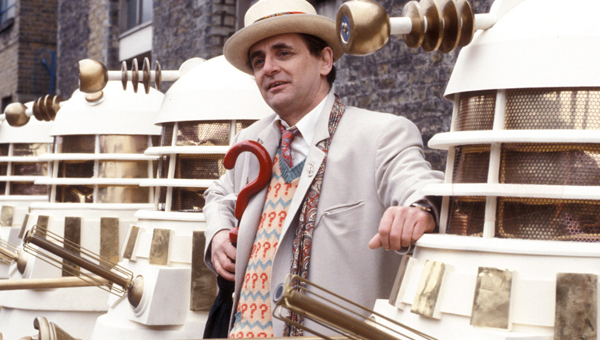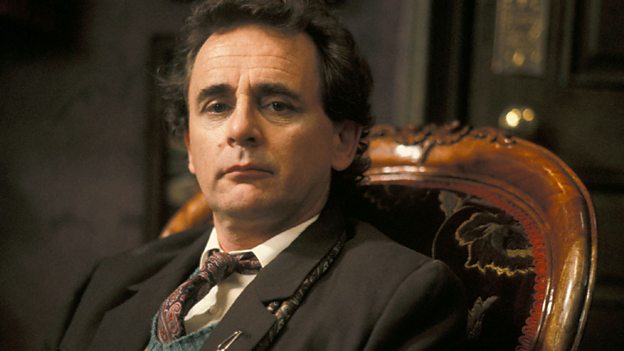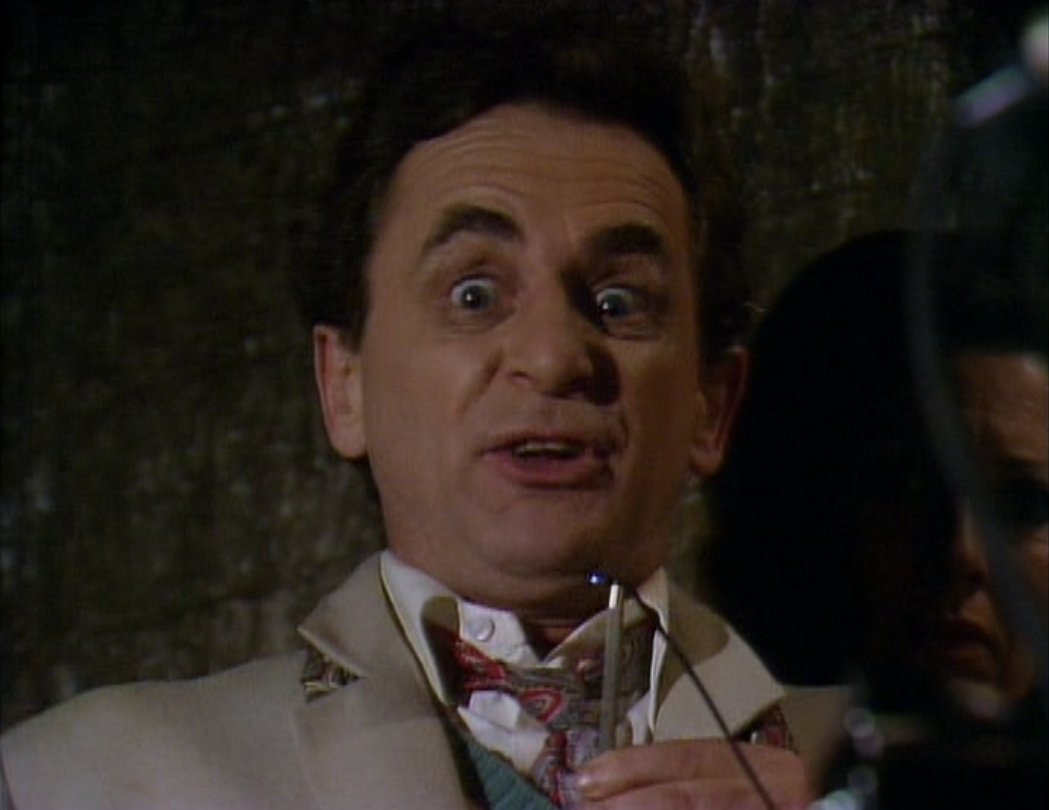The Seventh Doctor arrived during a turbulent period in Doctor Who‘s history. Indeed, the axe was looming over the programme after the hiatus of 1985 / 86. The script editor (Eric Saward) had left the show before the end of Season 23 – and, unexpectedly, this turned out to be the last series for the Sixth Doctor, played by Colin Baker. The producer found himself without a script editor, an incumbent Doctor, or even a regeneration scene to mark Six’s departure, as Colin Baker hadn’t wished to record one.

As such, when we look back at the Seventh Doctor’s era, its remarkable to think that it even happened. It divides opinion amongst some fans, and arguably it’s an era that takes time to really get going. But for many, this is one of the most creative and mysterious periods in the show’s history, with many stories that have been firmly cemented as classics.
So if you’re new to all-things Seventh Doctor and are thinking of joining him on his travels throughout time and space, here’s a handy guide to get you started.
Clown, or devious manipulator?
The Seventh Doctor is a difficult character to sum up. On the surface, he’s a whimsical, Chaplin-esque clown who bumbles absent-mindly through his adventures. Indeed, you could be forgiven for thinking this if you watched ‘Time and the Rani’ or perhaps even ‘Dragonfire,’ which take place during his first season (Season 24.) This is certainly reflected in his attire, which comprises a question mark tank top, a Paisely hanky and Brogues – with a question mark umbrella to boot.

But there’s a dramatic shift that takes place for the Seventh Doctor, starting at the beginning of Season 25 with ‘Remembrance of the Daleks’ and arguably peaking in Season 26’s ‘Ghost Light’ where, in both instances, he’s seen to be a more powerful, manipulative presence. In ‘Ghost Light,’ for example, he takes his companion Ace to the place that she most fears – a ‘haunted’ house in the town of Perivale – fuelled by his insatiable curiosity. In fact, he doesn’t even tell her what he’s doing – until she twigs.
And in ‘Remembrance’ he talks a Dalek into destroying itself, and also launches into a tirade against its creator Davros, which is entirely put-on; he’s actually trying to provoke his enemy into activating the Hand of Omega, and blow himself up.
In short, you shouldn’t be fooled by the Seventh Doctor’s joviality. There’s a lot more going on beneath the surface, and he always knows more than he’s saying.
Far more than just another Time Lord?
This is something the Doctor says to Davros, shortly before he launches the Omega device. “Oh Davros,” he mutters. “I am far more than just another Time Lord.” Of course, this line was cut from the broadcast version, so its canonicity is subject to debate. But we know from other stories in the Seventh Doctor’s era that this declaration holds some weight.

Certainly, the Seventh Doctor elaborates on this at other points in ‘Remembrance of the Daleks.’ In a conversation with Ace, he alludes to the fact that he was present on Gallifrey (the Time Lords’ home planet) during the time of the Hand of Omega’s creation. This is significant because, if true, it could mean that the Doctor was one of the founding fathers of Gallifreyan society, and also developed the Time Lords’ ability to travel through time. Forum-melting stuff!
Furthermore, the villainous Lady Peinforte talks about his mysterious past in the Season 25 story ‘Silver Nemesis.’ She claims to know the Doctor’s “secret,” suggesting that she has discovered his true identity and the details of the “old time” of Gallifrey, which she refers to as “the time of chaos.” She procured this information from a lump of living metal known as validium (or Nemesis) which was created by Rassilon and Omega, two of Gallifrey’s founding fathers. The statue, apparently, knows about the Doctor’s origins, and discussed everything it knew with Lady Peinforte.
Now, these tantalising details are all we’re given, and even if the Doctor’s famous line about being “far more than just another Time Lord” belongs on the cutting room floor, it’s obvious from the other moments in his era that he was telling the truth.
Which are the key Seventh Doctor stories?
I’ve written previously about my top 3 Seventh Doctor stories – as in, the ones that I enjoy the most. But these aren’t necessarily “the most important.” If you’re curious about the Seventh Doctor’s obscure past, then you should certainly tune into ‘Remembrance of the Daleks’ and ‘Silver Nemesis.’ The former is exceptionally well-written, and the latter is a joyous romp with the dreaded Cybermen, so I can promise you won’t be disappointed.
I would also recommend watching ‘Time and the Rani.’ This is the Seventh Doctor’s first adventure, first broadcast in 1987, and has garnered something of a bad reputation over the years for being a little camp, and veering too close to sitcom territory. (Ironically, his companion Mel at one point cries, “I’ve had enough of this drivel!”)
But let’s be fair – adventures such as ‘Time and the Rani’ are important, transitional milestones in Whodom. And plus, I don’t actually think ‘Time and the Rani’ is that bad, all things considered.
Otherwise, you’ll certainly want to check out the aforementioned ‘Ghost Light’ from Season 26, and also ‘The Curse of Fenric.’ But when you do, turn down the lights, switch off your phone, and don’t talk to anyone! These are incredibly complex tales, and if you miss just one line of dialogue, you may struggle to grasp the rest of the plot! That’s not to say they’re not enjoyable romps; indeed, they’re amongst many fans’ favourites! But they do command a lot of attention.
Finally, be sure to add ‘Survival’ to your viewing list, as this is the last (ever!) classic Doctor Who adventure, broadcast in 1989. It’s a shame, but also a blessing, as ‘Survival’ happens to be a really, really good story – gritty, dramatic, poignant, and even featuring the return of the Master no less! I dare you not to weep in the closing moments of Episode Three as the Doctor walks his companion Ace back to the TARDIS, promising her “people made of smoke and cities made of song.”
As I say, it’s a real pity that the BBC chose to pull the plug at this point in the show’s history, but the Seventh Doctor goes out on a real high, and it’s a fitting end to Classic Who‘s epic 26 year run.
So what do you think? Are you tempted to explore the Seventh Doctor’s era for the first time? Or are you already a fan? If so, which is your favourite moment from this period in Who history? Leave your thoughts in the comments below.
And if you’re in the mood for some question mark pullover action, check out our guide to cosplaying the Seventh Doctor’s outfit.

Seventh Doctor silk Paisley scarf – order now from the Lovarzi shop!
Latest posts…
- Amy Pond: Why can’t the Doctor save her?
- Doctor Who: Ranking all of the Auton stories
- 3 problems faced by Doctor Who showrunners
- Doctor Who: Ranking all of the classic Sontaran stories
- Is Doctor Who Season 13 the pinnacle of the Tom Baker era?


Seventh Doctor and Ace were the combi of my childhood. I still thinks he’s the best. I love that mix of dark and light – it’s what Tennant did so well too.
The 7th Doctor was my Doctor, the reason I am a massive Whovian now. He brought the darkness back to the show and along with the Legendary Ace, they laid the blueprint for modern Who